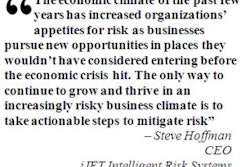
San Francisco — January 15, 2010 — While global corporations are focusing on creating collaborative partnerships with suppliers to make supply chains more efficient, a recent survey of Fortune 1000 executives indicates that companies' top concerns include ongoing supplier financial viability, ensuring regulatory compliance and managing suppliers in emerging markets.
The poll results were announced by Aravo, a provider of software-as-a-service supplier information management (SIM) software and services. The poll was conducted during Aravo's recent supply chain risk Webinar series and via e-mails to Fortune 1000 risk, finance, procurement and supply chain executives. More than 200 companies responded to the questions.
A significant number of those polled (71.4 percent) expressed that their biggest concern continues to be risk of supplier financial viability. However, despite these concerns, more than half of the financial, procurement and risk executives polled have less than 20 percent of their supplier base under active risk management.
Companies that participated in the Aravo-sponsored poll are also exploring opportunities to maximize budgets by adding more emerging market suppliers. For instance, Aravo found that 31.2 percent of those polled are "heavily penetrated in emerging markets," while another 31.2 percent have "already sourced some suppliers in emerging markets and are looking to expand low-cost country suppliers in 2010."
Not surprisingly, the top concern around suppliers in emerging markets is regulatory compliance (41.7 percent), followed by the financial viability of these suppliers (33.3 percent). Only 25 percent of those polled were concerned about product quality.
"Based on our poll results we see a call to action for global corporations to implement more robust risk management processes to reduce the possibility of supplier failures and supply disruptions, improve supplier performance management and enhance supplier compliance initiatives," said Aravo CEO Tim Albinson. "More than half the companies we surveyed are managing 20 percent or fewer of their suppliers for risk, which is an alarming statistic."
Albinson suggested that large enterprises today require a comprehensive supplier risk management solution to provide supply chain teams with the data and intelligence required for proactive supplier risk management. "As we saw in 2008 and 2009, supplier failures can lead to broader business failures, so this is a critical area for business leaders to get right," he said.
The poll results were announced by Aravo, a provider of software-as-a-service supplier information management (SIM) software and services. The poll was conducted during Aravo's recent supply chain risk Webinar series and via e-mails to Fortune 1000 risk, finance, procurement and supply chain executives. More than 200 companies responded to the questions.
A significant number of those polled (71.4 percent) expressed that their biggest concern continues to be risk of supplier financial viability. However, despite these concerns, more than half of the financial, procurement and risk executives polled have less than 20 percent of their supplier base under active risk management.
Companies that participated in the Aravo-sponsored poll are also exploring opportunities to maximize budgets by adding more emerging market suppliers. For instance, Aravo found that 31.2 percent of those polled are "heavily penetrated in emerging markets," while another 31.2 percent have "already sourced some suppliers in emerging markets and are looking to expand low-cost country suppliers in 2010."
Not surprisingly, the top concern around suppliers in emerging markets is regulatory compliance (41.7 percent), followed by the financial viability of these suppliers (33.3 percent). Only 25 percent of those polled were concerned about product quality.
"Based on our poll results we see a call to action for global corporations to implement more robust risk management processes to reduce the possibility of supplier failures and supply disruptions, improve supplier performance management and enhance supplier compliance initiatives," said Aravo CEO Tim Albinson. "More than half the companies we surveyed are managing 20 percent or fewer of their suppliers for risk, which is an alarming statistic."
Albinson suggested that large enterprises today require a comprehensive supplier risk management solution to provide supply chain teams with the data and intelligence required for proactive supplier risk management. "As we saw in 2008 and 2009, supplier failures can lead to broader business failures, so this is a critical area for business leaders to get right," he said.












